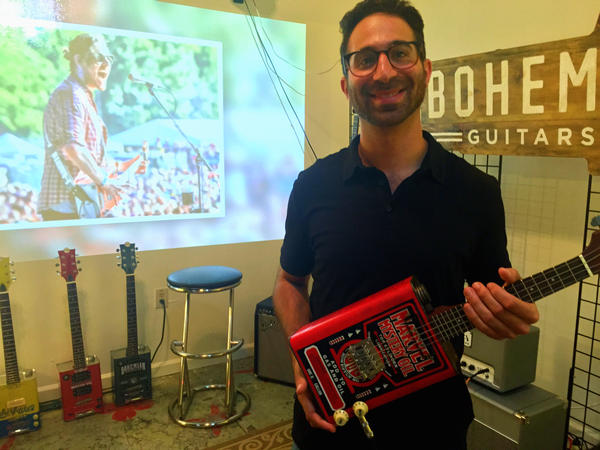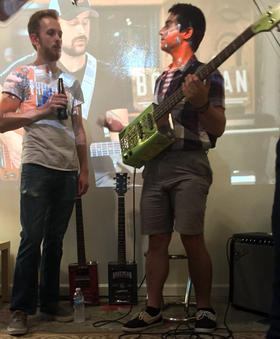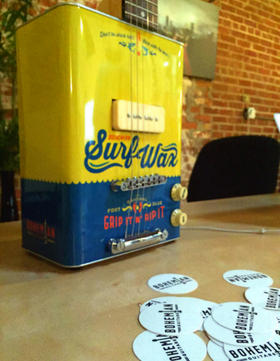Crowdfunding Concept Developed In Georgia Slow To Catch On

An audio version of this story
Bohemian Guitars claims an expansive, yet modest industrial loft in Atlanta’s Old Fourth Ward as its worldwide headquarters. While small compared to most corporate main offices, it’s a far cry from Stephen Lee’s basement. That’s where, about four years ago, his sons Shaun and Adam first started turning old oil cans into distinctive-sounding guitars.
“It became a warehouse,” Lee said. “I was only too happy to have them there because it was where they started to grow.”
But even as orders steadily amassed, Dad remained skeptical. That’s until a major retailer called. Urban Outfitters was ready to put Bohemian on its shelves, and on the map.
“I said, ‘That’s your break — because a major store like that? You’ve made it,’” Lee said.
And Bohemian has made it. Some of music’s biggest names now use the company’s signature oil-can instrument onstage. Major music retailers put Bohemian guitars alongside big, well-known brands like Fender and Gibson.
And that success is one reason the brothers feel it’s time to open a new chapter. For the first time, Bohemian will produce an instrument other than a guitar. The signature oil-can sound will soon be available in bass and ukulele versions.
“There [are] all these tiny little intricate details that have an effect on the feel and the sound,” said Shaun Lee as he strummed a ukulele, enthralled with the mellow tones coming from his creation. He says one reason the oil-can ukulele makes a “not-quite-ukulele sound” is because Bohemian’s version uses strings made of nickel. Most manufacturers use nylon, which is cheaper to produce.
Developing the new offerings was just the first step. Now, the Lee brothers must get the new instruments into customers’ hands.
To help do that, they recently put together a launch party.
The hope?
Those who stop in to check out the new offerings will be so captivated by their sound, they won’t hesitate to go online, pluck down $90 and preorder a Bohemian ukulele for themselves. 
Bohemian hopes to raise $37,000 to cover the new products’ manufacturing costs. To manage that process, the Lee brothers chose the crowdfunding website Indiegogo.
When it comes to raising cash through a crowdfunding campaign, Adam and Shaun are masters.
Just a few years ago, a similar Kickstarter crusade netted them enough cash to move out of their dad’s basement.
Despite that initial success and their familiarity with online crowdfunding, the Lee brothers took a chance two years ago on a similar — but unproven — concept.
Bohemian became the poster child for a process dubbed equity-based crowdfunding. Instead of customers fronting money in exchange for an item — the model for a standard crowdfunding campaign –equity-based crowdfunding instead makes it possible for supporters to become investors, putting up cash in exchange for equity in the business
While that might not sound revolutionary, the federal government long made it nearly impossible. Trading cash for equity was reserved only for the ultra-rich, a move that came in response to the 1929 stock market crash that ushered in the Great Depression.
Despite the generations-old federal prohibition, states maintain the power to regulate their own commerce, as long as it takes place within their own borders.
A Georgia law passed with little fanfare in 2011 opened the door here for equity-based crowdfunding.
Two years ago, Atlanta attorney Jeff Bekiares used that legal loophole as the basis to launch SparkMarket. Bekiares said it is the first company in Georgia to guide an equity-based crowdfunding campaign. Bohemian Guitars was SparkMarket’s first client.
“There was a lot of energy and a lot of buzz that got generated from that campaign,” said Bekiares, which ultimately helped Bohemian raise about $200,000.
But getting to that goal wasn’t easy.
“It’s a major educational effort,” Bekiares said. He said SparkMarket folks spent a lot of time explaining the concept to both skeptical business owners and hesitant potential investors.
Bekiares feels that lack of understanding and uncertainty is why Georgia has only seen about 50 or 60 equity-based crowdfunding attempts in the past few years.
And the number of those that succeeded? He said about 10 percent to 20 percent. In other words, you can count them on one hand, maybe two.
Despite an admittedly slow uptake, Bekiares remains equity-based crowdfunding’s biggest cheerleader. Just give it a few more years, he said.
“When we were here two years ago, there were only two states in the Union where you could do this,” he said. Kansas was the first state to make the concept possible; Georgia was second.
But today, Bekiares said, 23 states are onboard. He believes California will soon join that list — a move he calls a “game changer.”
So given the concept’s growing support and a successful six-figure grab in 2013, it seems a no-brainer that Bohemian founders Adam and Shaun Lee would come back to SparkMarket for the company’s latest capital-raising needs.
But they chose not to.
Shaun Lee said looking back, SparkMarket and the equity-based crowdfunding route was a good decision at the time. It got Bohemian unprecedented attention.
“But was it the best way to raise money? Maybe not,” Lee said.
Instead, Bohemian is returning to its roots, using a traditional online crowdfunding site to raise money one supporter — and one ukulele — at a time.
9(MDAxODM0MDY4MDEyMTY4NDA3MzI3YjkzMw004))





